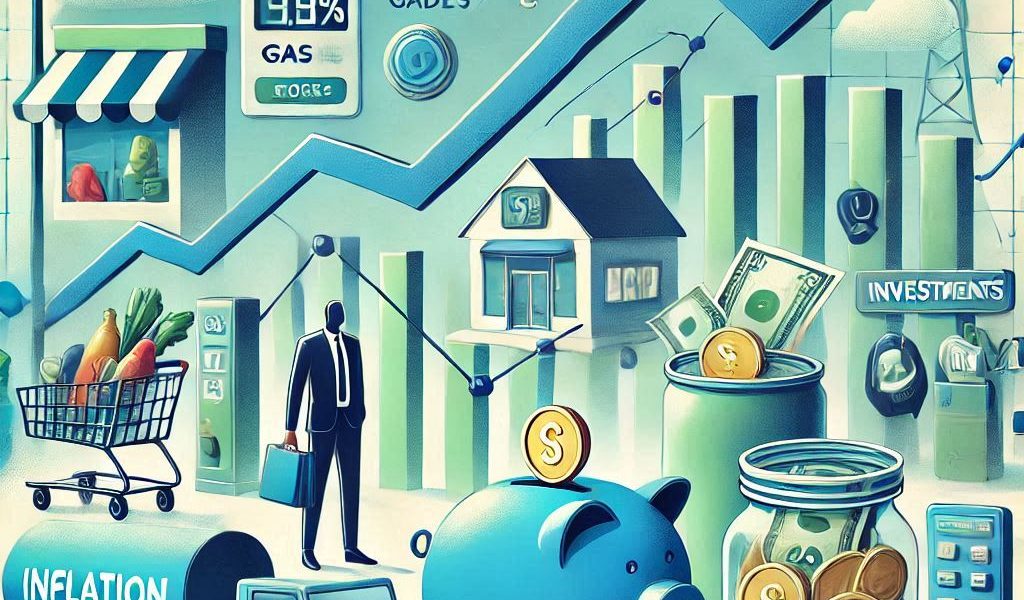Inflation is one of the most significant factors influencing the economy and can have a profound effect on the financial decisions of individuals, businesses, and governments alike. For consumers, rising inflation means that the purchasing power of their money decreases, which in turn impacts their spending habits and saving behaviors. As inflation continues to be a key concern for economies around the world, it is essential for investors to understand how this phenomenon affects consumer spending and savings. In this blog, we’ll explore the impact of inflation on these two crucial areas and discuss strategies for managing personal finances in an inflationary environment.
What Is Inflation?
Inflation refers to the general increase in the prices of goods and services over time, which leads to a decrease in the purchasing power of money. When inflation is high, each unit of currency buys fewer goods and services. Inflation is often measured by the Consumer Price Index (CPI), which tracks the prices of a basket of common household items like food, housing, and transportation.
1. The Impact of Inflation on Consumer Spending
As inflation rises, consumers tend to spend more on the same goods and services due to increased prices. This can lead to a reduction in discretionary spending, as individuals may prioritize essential items such as food, healthcare, and energy. Here are some key ways inflation affects consumer behavior:
Increased Prices for Everyday Goods
Inflation directly affects the cost of everyday items like groceries, gas, and utility bills. As prices rise, consumers have less money available for non-essential items such as entertainment, dining out, or luxury goods. This shift in consumer spending patterns can impact businesses that rely on discretionary spending.
Lower Consumer Confidence
High inflation can create a sense of financial uncertainty, leading to decreased consumer confidence. When individuals feel that their purchasing power is eroding, they may become more cautious with their spending, opting to save more and delay big-ticket purchases like cars or homes.
Shift Towards Value-Oriented Products
In response to rising prices, consumers often switch to more affordable alternatives. This can be seen in the increased demand for store-brand products over premium brands or the growth in demand for second-hand goods. Businesses that offer value-oriented products or services may benefit in times of inflation.
What it means for investors:
Inflation can lead to changes in consumer behavior, which affects the performance of various sectors. Companies in industries such as luxury goods, travel, and entertainment may experience a slowdown in demand, while those in the basic necessities sector (e.g., food, utilities) may see stable or increased demand.
2. The Impact of Inflation on Savings
Inflation can also have a significant impact on savings, especially for individuals who rely on cash savings or low-interest accounts. As the value of money decreases due to inflation, the real value of savings erodes over time. Here’s how inflation impacts savings:
Decreased Purchasing Power of Savings
If inflation exceeds the interest rates earned on savings accounts, the real value of savings decreases. For example, if inflation is 4% and a savings account offers an interest rate of 2%, the purchasing power of the money in the account has effectively declined by 2%. This erodes wealth over time, especially for long-term savers.
Shift Towards Investment Assets
To combat the effects of inflation, many individuals turn to investment assets that can offer returns that outpace inflation, such as stocks, bonds, or real estate. While these investments carry risks, they provide the potential for higher returns and help preserve the value of savings.
Increased Demand for Inflation-Protected Assets
Inflation-linked bonds, such as Treasury Inflation-Protected Securities (TIPS), are designed to adjust with inflation, offering protection against rising prices. These types of investments have become more attractive to savers looking to hedge against inflation’s impact on their wealth.
What it means for investors:
Inflationary pressures can drive a shift in consumer savings behavior, pushing more individuals towards riskier or more diversified investments. Investors should consider inflation-protected assets and focus on asset classes that historically outperform during inflationary periods, such as stocks, real estate, and commodities.
3. Strategies for Consumers and Investors to Manage Inflation
While inflation can certainly disrupt financial plans, there are effective strategies that consumers and investors can adopt to mitigate its impact:
For Consumers:
- Budget Wisely: Regularly reviewing your budget and adjusting spending to prioritize essential items can help you manage inflation’s effects on your daily life.
- Cut Back on Non-Essential Spending: Limiting discretionary expenses such as dining out, entertainment, and luxury purchases can help you save more in an inflationary environment.
- Look for Bargains and Discounts: Shifting to value-oriented products, using coupons, and seeking sales can help consumers stretch their budgets further.
For Investors:
- Diversify Your Portfolio: A well-diversified portfolio can help protect against inflation’s impact. Consider including assets that perform well during inflationary periods, such as equities, real estate, and commodities.
- Invest in Inflation-Protected Assets: Inflation-linked bonds or funds that invest in TIPS can offer protection against inflation and help preserve your purchasing power.
- Focus on Dividend Stocks: Dividend-paying stocks provide regular income and can serve as a hedge against inflation, especially in times of rising prices.
Conclusion: Adapting to an Inflationary Environment
Inflation is an inevitable economic force that affects both consumer spending and savings. While it can make everyday life more expensive, there are ways to adapt and mitigate its impact. For consumers, this means being mindful of their spending habits and seeking value-oriented alternatives. For investors, it means diversifying their portfolios and focusing on assets that can outperform inflation over time.




